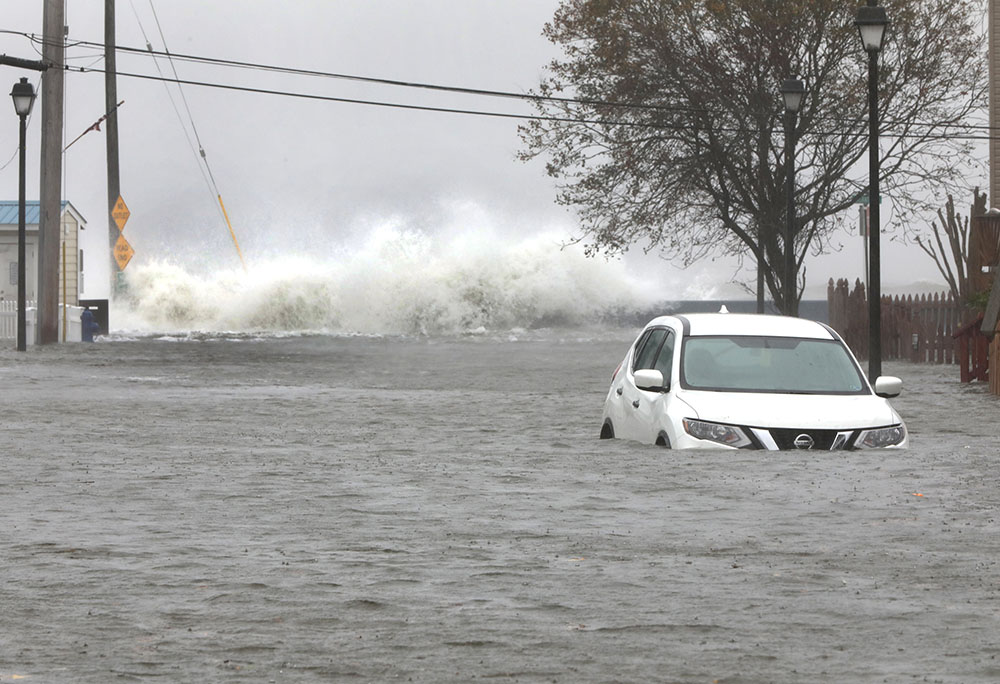
Waves crash over rocks near a submerged vehicle along Maryland's Chesapeake Bay during a Nor'easter in North Beach Oct. 29, 2021. (CNS/Bob Roller)
What's being called perhaps Maryland's most momentous legislative session on climate change in decades had ample backing from Catholics and their bishops across the state.
The 2022 legislative session of Maryland's General Assembly adjourned Monday, April 11, at midnight, with environmental advocates celebrating a major victory in the form of the Climate Solutions Now Act of 2022. The new law sets goals for the state to slash its greenhouse gas emissions by 60% below 2006 levels by 2031 — the most ambitious near-term emissions goal in the country — and to reach net-zero emissions by 2045.
To get there, the law requires buildings more than 35,000 square feet to cut their emissions; utilities to generate the vast majority of electricity from no- to low-carbon sources by 2030; the state's vehicle fleet, including school buses, to electrify by 2031; and creates a "green bank" for emissions-cutting projects, with 40% of resources directed to low- and moderate-income communities. It also exempts from property taxes community solar systems serving low-income communities with affordable energy, and expands the Chesapeake Conservation Corps.
At one point, it seemed the comprehensive climate legislation was a possible veto target for Republican Gov. Larry Hogan, who referred to it as a "reckless and controversial energy tax bill." Ultimately, on April 8 he refrained from signing it but allowed it to become law.
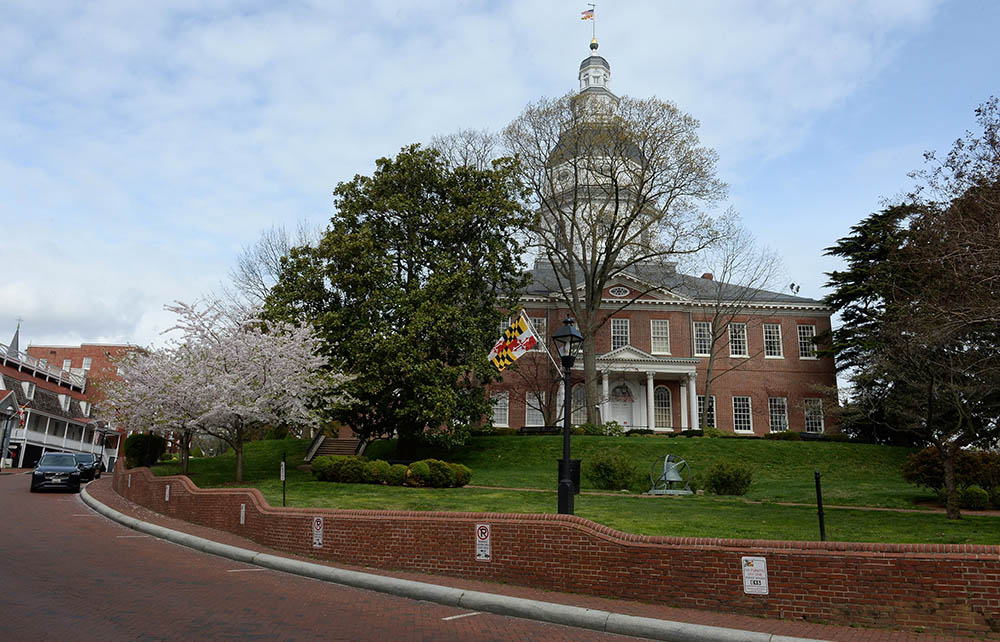
The Maryland State House is seen in Annapolis March 31, 2020. (CNS/Reuters/Mary F. Calvert)
The Maryland League of Conservation Voters called the Climate Solutions Now Act "a historic breakthrough" after a similar bill failed last year and said that overall "the session may be remembered as one of the most successful and momentous in decades."
"It was a very significant legislative session, for what was accomplished for the environment," said Bob Simon of Maryland Catholics for Our Common Home.
The lay-led Catholic environmental group joined the Maryland Catholic Conference, the public policy arm representing the Washington and Baltimore archdioceses, in supporting numerous environment-related bills throughout the session.
In addition to the Climate Solutions Now Act, other legislation passed (but not yet signed by Hogan) that would make energy efficiency upgrades accessible to low-income houses, provide more equitable public transportation and limits the use of PFAS "forever" chemicals in consumer products. Another bill, requiring climate risks be considered in investments of the state pension system, also became law without Hogan's sign-off.
Advertisement
The Maryland Catholic Conference made climate change one of its five priority issues — alongside restricting abortion, support for incarcerated mothers, outlawing ghost guns, and scholarships for students from low-income families — for the legislative session and its statewide Catholic Advocacy Day.
"We recognized that climate was a major priority for the legislature and wanted to give Catholics a wide variety of issues to advocate on behalf of," Jenny Kraska, executive director of the conference, told EarthBeat in an email.
Overall, the Maryland Catholic Conference provided testimony in support of more than a dozen bills related to climate change and environmental issues, including tax credits for energy efficiency and solar energy and a constitutional amendment establishing the right to a healthy and sustainable environment, which did not advance. While the conference did not take a position on the Climate Solutions Now Act, it supported a similar climate bill in the House, HB 708.
Maryland Catholics for Our Common Home collected more than 700 signatures from roughly three dozen parishes in 33 of the state's 47 legislative districts in support of six priority bills, including the Climate Solutions Now Act.
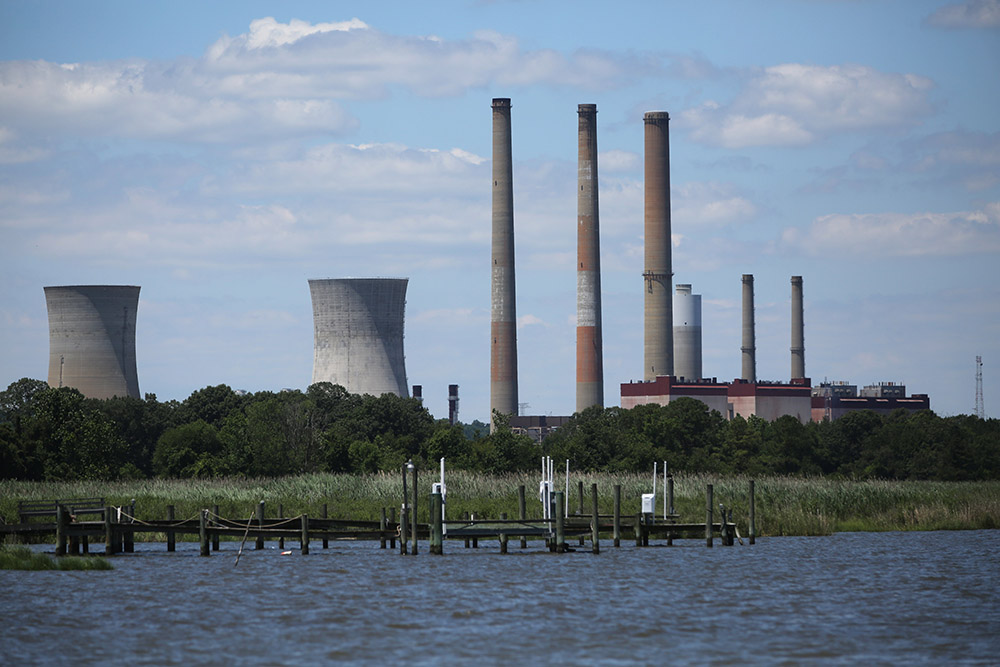
The Chalk Point Generating Station is pictured along the Patuxent River in Eagle Harbor, Maryland, June 24, 2020. (CNS/Bob Roller)
Simon, a former energy and climate policy expert on Capitol Hill, told EarthBeat that the bills responded to what Pope Francis has called the cry of the Earth and the cry of the poor.
"We try to find bills that both respond to the environmental crisis, but also respond to issues of economic justice, economic equity, environmental equity for the poor of the Earth" and the needs of everyday Marylanders, Simon said.
Kraska told EarthBeat that while the conference has advocated before on bills impacting climate, the release of "Laudato Si', on Care for Our Common Home," Francis' 2015 encyclical on the environment and human ecology, "greatly aided our efforts to be more vocal on climate and broader environmental issues." For example, the conference quoted from Laudato Si' in many of the testimonies it issued on environmental bills.
Earlier in the legislative session, the Maryland Catholic Conference organized two virtual town hall gatherings that included lawmakers, state officials, scientists, environmental activists, business leaders and church representatives, headlined by Washington Cardinal Wilton Gregory and Baltimore Archbishop William Lori.
"Here in Maryland, where the bounty of God's creation is very abundant and surrounds us from the waters of the Atlantic to the mountains of western Maryland, we are all called to protect our common home, to exercise stewardship over God's creation according to our ability and our means, and in ways big and small," Gregory said during the March 9 event.
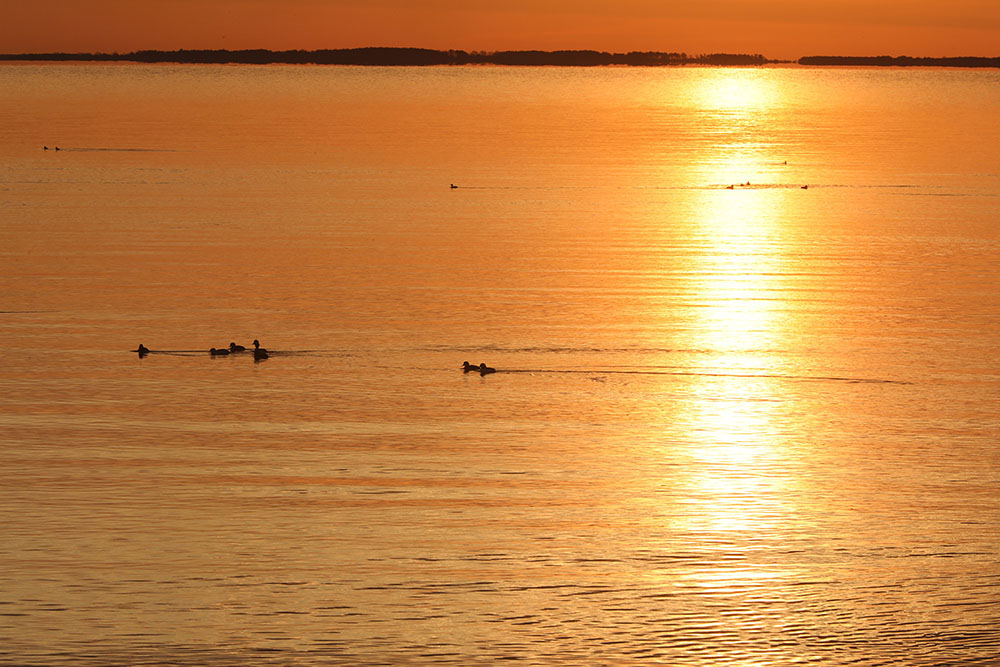
Buffleheads, or sea ducks, float in the early morning hours on Maryland's Chesapeake Bay March 30. (CNS/Bob Roller)
He added that the church is committed to working with partners, including in government, "to ensure we do everything possible to bring about environmental justice and promote personal responsibility to care for the gifts that God has entrusted to our care."
As global temperatures have risen, Maryland has become warmer and wetter. With 3,100 miles of shoreline, the state is among the most vulnerable to climate change and rising sea levels. A February report from the National Oceanic and Atmospheric Administration projected that seas will rise 10 to 14 inches on the East Coast over the next three decades, and cities like Annapolis will experience several damage-causing "moderate" floods a year by midcentury, compared to a few "nuisance" tidal floods now.
The town halls, funded through small grants from the Victory Noll Sisters in partnership with the Catholic Climate Covenant, discussed the state of the environment in Maryland, legislative priorities in the General Assembly, and why environmental issues are of concern for Catholics.
"Caring for the environment is as much about caring for our common home as it is about protecting the dignity of every human person," Lori said in the Feb. 15 town hall. "And this is fundamental to all that the church believes and teaches."
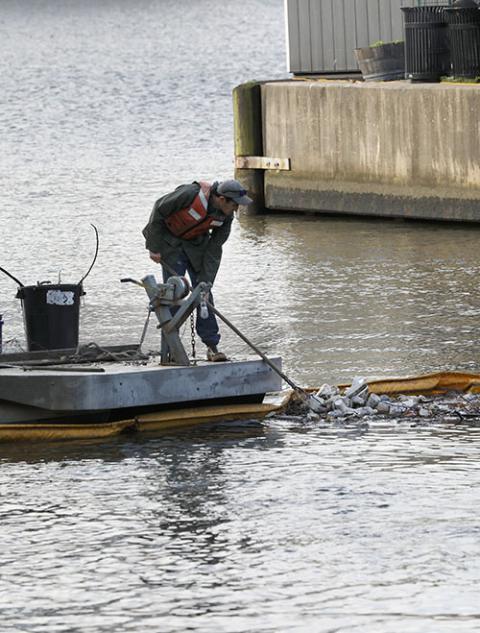
A worker collects trash in a containment along Baltimore's Inner Harbor June 11, 2019. (CNS/Bob Roller)
Several of the speakers during the two town halls spoke of the disparate and unequal ways that environmental issues affect communities in Maryland. State Sen. Jill Carter, a co-sponsor of the climate solutions act, noted that asthma rates in Baltimore are higher than state and national averages, and the problem is worse among African Americans.
Carter said that unjust policies like redlining in Baltimore "tremendously perpetuated environmental injustice" by segregating often Black and Hispanic communities from green spaces, clean air and water and investments to cultivate healthy environments.
In his remarks, Lori said that Francis warned in Laudato Si' about becoming overreliant on technological solutions to environmental issues and stressed the importance of examining the underlying problems and not just the symptoms. He added the pope called all members of a community to "active participation" in developing comprehensive approaches to complex environmental challenges.
"We have to be very conscious of what's happening in neighborhoods and what happens to the people living in those neighborhoods when there is environmental degradation and those who are underserved," Lori said, adding "it is incumbent upon the church just not only to speak about it, but then to do something about it."
In addition to legislative advocacy, the Washington Archdiocese unveiled in August a Laudato Si' action plan for the local church to put the encyclical words to work — Gregory commissioned a similar document while archbishop of Atlanta — as its way of participating in the Vatican's Laudato Si' Action Platform for Catholic institutions and families worldwide.
Maryland Catholics for Our Common Home has been active for years in supporting legislative efforts to respond to the growing impacts of climate change and other environmental challenges facing the Free State. Now its members plan to turn their attention to asking Catholics to urge the governor, who is also Catholic, to sign into law two bills on his desk, one to provide energy efficiency upgrades to low-income houses and another providing equitable public transportation.
The group will also look to regroup around several bills that failed to pass the General Assembly, among them the constitutional amendment on environmental rights, the Maryland the Beautiful Act and a bill that would downgrade polluting energy sources like waste incinerators in the state renewable electricity standard.
"Since such facilities are often sited near low-income communities, there is obviously a justice angle here," Simon said.








